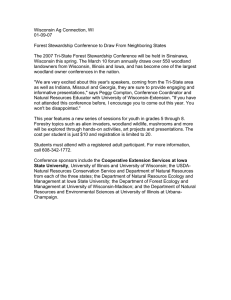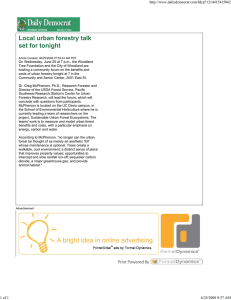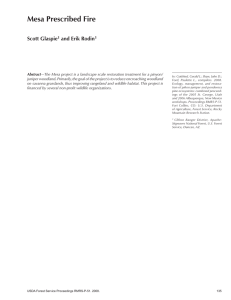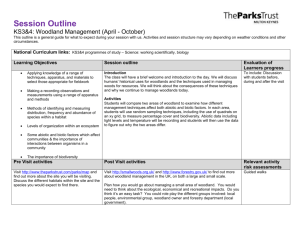Annual Report for 2007 t T
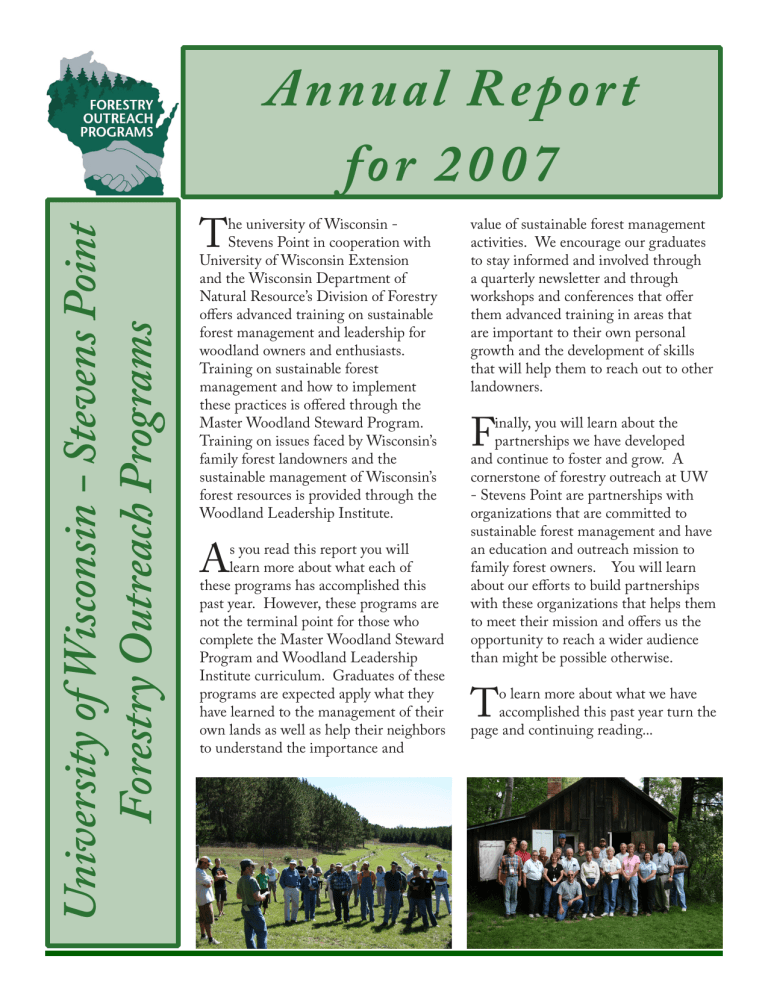
Annual Report for 2007
T he university of Wisconsin -
Stevens Point in cooperation with
University of Wisconsin Extension and the Wisconsin Department of
Natural Resource’s Division of Forestry offers advanced training on sustainable forest management and leadership for woodland owners and enthusiasts.
Training on sustainable forest management and how to implement these practices is offered through the
Master Woodland Steward Program.
Training on issues faced by Wisconsin’s family forest landowners and the sustainable management of Wisconsin’s forest resources is provided through the
Woodland Leadership Institute.
A s you read this report you will learn more about what each of these programs has accomplished this past year. However, these programs are not the terminal point for those who complete the Master Woodland Steward
Program and Woodland Leadership
Institute curriculum. Graduates of these programs are expected apply what they have learned to the management of their own lands as well as help their neighbors to understand the importance and value of sustainable forest management activities. We encourage our graduates to stay informed and involved through a quarterly newsletter and through workshops and conferences that offer them advanced training in areas that are important to their own personal growth and the development of skills that will help them to reach out to other landowners.
F inally, you will learn about the partnerships we have developed and continue to foster and grow. A cornerstone of forestry outreach at UW
- Stevens Point are partnerships with organizations that are committed to sustainable forest management and have an education and outreach mission to family forest owners. You will learn about our efforts to build partnerships with these organizations that helps them to meet their mission and offers us the opportunity to reach a wider audience than might be possible otherwise.
T o learn more about what we have accomplished this past year turn the page and continuing reading...
T he purpose of the
Woodland Leadership
Institute is to provide participants with a deeper understanding of the issues facing Wisconsin’s forestlands and forest management philosophies that emphasize the sustainability and stewardship of Wisconsin’s forest resources. The institute accomplishes this through the seminars, readings, observations and interviews of community leaders, and the sharing of ideas and feedback among the participants.
T his year’s Institute featured a new partnership with the Minnesota
Forestry Association (MFA), University of Minnesota Extension, and the Blandin
Foundation that allowed eleven members of the Minnesota Forestry Association to participate in this year’s program. Funding was provided by the MFA and the Blandin
Foundation to support the participation of
MFA members in the Institute. University of Minnesota Extension Forestry Specialist
Mike Reichenbach served as the leader for the
Minnesota participants.
T he Class of 2007 featured twentyone participants from Minnesota and
Wisconsin. These participants received more than 50 hours of classroom instruction and presentations in the field from nearly 30 natural resources, community development, and extension professionals. Three seminars are held each year. The first seminar focuses on issues related to the sustainability and stewardship of Wisconsin’s forest resources.
The second seminar focuses on understanding what sustainable forest management is and how it is practiced in Wisconsin. The third seminar looks at examples of grassroots conservation efforts and leadership in
Wisconsin’s woodland owner organizations.
P articipants invest considerably more time as they are given readings and homework assignments to help them prepare for the next seminar. These exercises help participants to gain a better understanding of the topics to be discussed, attitudes and support for sustainable forest management in their community, opportunities for how they can use what they have learned as part of a woodland owner organization or in their local community, and by sharing these experiences with their classmates they give each other the opportunity to learn about the what is happening in different communities and organizations across the state.
A s a part of this process participants develop a Community Action Plan to address a specific need in their community.
This process gives them an opportunity to practice what they have learned through participating in the Institute and helps them to focus on how they can give back to their community.
I nstitute graduates have played important roles in the growth and maintenance of
Wisconsin’s woodland owner organizations and have been essential to the recruitment of each new class that has come after.
T he purpose of the Master Woodland
Steward Program is to offer training for woodland owners who are interested in learning more about sustainable forest management practices and becoming better stewards of their land.
P articipants in the Master Woodland
Steward Program received approximately
40 hours of classroom instruction and presentations in the field from over a dozen financial, natural resources and
Extension professionals. The Program includes seminars on Getting to know your
Woodlands which includes seminars on Tree
Identification and Forest Measurements;
Forest Management 101 which includes seminars on Forest Ecology, Silviculture, and Crop Tree Management; Financial planning for woodland owners; The Careful
Timber Harvest; Recreation, Aesthetics and
Specialty Forest Products; Wildlife Habitat
Management; and Chainsaw Safety.
T he program continues to be well received and as one participant noted
“I guess the only thing that I would change would be to add another day. There is so much to learn and so many great instructors that I felt cheated because we were always cut short on time.”
P articipants are expected to put into practice on their lands what they learn in the classroom through a series of homework assignments that they complete between each seminar.
The purpose of the homework assignments are to help landowners learn more about the resources available to help them manage their lands as they practice the skills they learn in class and become more familiar with the woodlands that they own.
T wo full series of Master Woodland
Steward Program seminars were offered in 2007 providing over eighty hours of classroom instruction and presentations in the field from sixteen Extension, natural resources, financial, and timber professionals.
O ne series was offered at the University of Wisconsin - Marathon County in
Wausau in cooperation with WWOA's North
Central Chapter. The Chapter helped to host the seminars and recruit chapter members to participate in the program. Twenty-five woodland owners participated in the program with eleven attending all of the seminars and completing the requirements of the Program.
T he second series of seminars was held at UWSP's Treehaven Field
Station, located near Tomahawk. This series also included an additional workshop on agroforestry systems and specialty forest products that included a field trip to a demonstration project installed by the
Golden Sands RC & D. Forty-one woodland owners participated in the program with ten attending all of the seminars and completing the requirements of the Program.
T his past year also featured a number of partnerships with organizations that are committed to sustainable forest management and actively hosts education programs for family forest owners. Our goals is to work cooperatively with these organizations to serve this audience rather than compete and create a situation where we all lose.
P artnerships were developed with the Wisconsin Woodland Owners
Association’s North Central Chapter, the
Aldo Leopold Foundation’s Woodland
School, the Living Forest Cooperative, and the Wisconsin Forest Resources Education
Alliance.
W orking with the Aldo Leopold
Foundation we were able to offer four
Master Woodland Steward Program seminars as a part of their Woodland School program.
The Woodland School hosted these seminars and provided supervision, logistical support, and on-site facilities for both classroom and field portions on the program.
W e were also able to continue our partnership with the Living Forest
Cooperative. We followed up last year’s successful partnership to offer the Master
Woodland Stewardship Program in
Ashland with a series of three workshops on locally relevant issues. The Living Forest
Cooperative was responsible for all aspects of the programs offered.
W e also worked with the Wisconsin
Forest Resources Education Alliance to offer their Forestry in a Landscape Context workshop. This project was a partnership of four forestry education organizations to develop and pilot intensive workshops for educators interested in integrating site-based
Environmental Education programs into K-12 school curriculum. The workshop integrated curriculum from the Woodland Leadership
Institute and Master Woodland Steward
Program and provided information, model activities, materials, and development tools to allow schools to develop interdisciplinary, standards-based forestry field programs that utilize the LEAF Lesson Guides and exemplify community-based education practices.
T hese partnerships provide each organization with an opportunity to improve their education and outreach mission and provided each of us with an opportunity to reach a larger audience than any of us are able to individually. This collaboration will continue as we are currently working with these organizations and more to see what might be possible in 2008.

